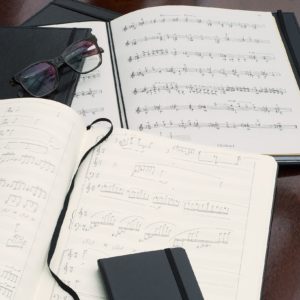 One of my best friends is a published author. With two popular and successful books under her belt, she gave up her day job to write full time and now her imagination and creativity seem to know no bounds. When we meet, she and I often end up discussing creativity, for the life of the writer and the musician are not dissimilar. We share similar processes – for example, the need to keep to a regular routine, as this fosters more consistent creativity and output – and we both appreciate the need to feed the muse: as my friend would say “what comes out must be put back”, and when our creative forces are depleted, we must stoke up further reserves of inspiration. She and I both also see value in accumulating experience and wisdom as we progress through our daily lives.
One of my best friends is a published author. With two popular and successful books under her belt, she gave up her day job to write full time and now her imagination and creativity seem to know no bounds. When we meet, she and I often end up discussing creativity, for the life of the writer and the musician are not dissimilar. We share similar processes – for example, the need to keep to a regular routine, as this fosters more consistent creativity and output – and we both appreciate the need to feed the muse: as my friend would say “what comes out must be put back”, and when our creative forces are depleted, we must stoke up further reserves of inspiration. She and I both also see value in accumulating experience and wisdom as we progress through our daily lives.
Just as writers have days when the creative juices seem to dry up, so too do musicians. We may rail against an unproductive practice session, frustrated that nothing seems to go right, the brain willing but the fingers sluggish and unresponsive – or vice versa. This can be seen as “wasted time”, pointless because you achieved nothing but, apparently, a slew of errors. It can be disheartening and demoralising to walk away from the instrument with the feeling that you have achieved very little.
In fact, nothing is wasted, and if we treat each practice session with curiosity and an open mind, it is possible to find useful nuggets in everything we do. Reflection is a significant aspect of deep practising, and it is important to consider why a practice session didn’t go as planned and to explore ways in which it could go better the next time. All errors should be regarded as learning opportunities (I used to tell my students “there’s no such thing as a wrong note”) and should be examined carefully: maybe that slip was due to a poor or improperly-learnt fingering scheme.
Debussy: Clair de lune (François-Joël Thiollier, piano)
Students in particular also believe that they should only be practising the music they have been assigned to practice by their teacher. Wrong. Any time spent at the piano is useful, even if you’re just noodling, messing around with some chords, improvising, or simply playing through some pieces which you enjoy playing. One of my students actually apologised to me for having learnt the first section of Debussy’s Clair de Lune during the Christmas break. “Why are you apologising?” I asked her. She said she thought I would be “angry” that she had practised something I hadn’t assigned to her. What she hadn’t realised was that by taking the initiative to learn some music without me, she had taken a first step towards a goal which is imperative for a musician: autonomy.
Time spent away from the instrument is also beneficial. Our daily lives feed the musical temperament and contribute to our music making, and it is simply unhealthy, and often unproductive, to spend hours locked away in the practice room. We draw on life experience to inform our artistry and activities which may seem divorced from our musical lives can actually inspire and inform. Don’t feel guilty about spending time reading a book or watching a movie: this is not “wasted time” for the musician, and nor is “down time”, for body and mind need time to rest and unwind to be ready for the next practice session or performance.
Duparc: L’Invitation au voyage (version for voice and piano) (Elsa Dreisig, soprano; Jonathan Ware, piano)
As musicians we should cultivate curiosity, not only in practicing and performance, but in our daily lives, and just as the writer may squirrel thoughts away in a notebook, so we too should store ideas. This way we ensure that nothing is wasted, and everything contributes to the richness and variety of our musical lives.




